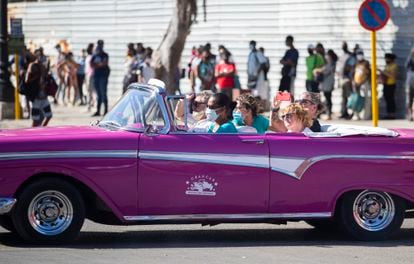A classic car travels with tourists on February 22, in Havana. Yander Zamora (EFE)
The sanctions against Russia for the invasion of Ukraine are beginning to be felt in Cuba.
The closure of European airspace to Russian planes has led to the cancellation of regular flights between Moscow and Havana and the end of tourist trips from Russia, which in the last year had become the main source of tourism to the island and as a lifeline for one of the most important Cuban industries, at a time when the country is going through an acute crisis and financial tensions are extreme.
Russian tourism to Cuba increased almost 200% in two years, going from 74,019 travelers in 2020 to 146,151 in 2021, when the island received 573,000 travelers, 87% less than in 2019 (4,200,000 tourists visited Cuba that year ).
The Association of Russian Tour Operators has reported that the closure of the airspace of the European Union and Canada for Russian planes forced the operators to suspend the sale of trips to Latin America and the Caribbean.
In a statement, the association has reported that as of February 28 it canceled all trips to Cuba, the Dominican Republic, Mexico and Venezuela.
At the moment, thousands of tourists from the Eurasian country spend their vacations on the island.
Moscow sources have said that the airlines of that country will fly to the island to pick them up on charter flights through routes that make longer and more expensive routes, but new tourists will not be able to travel on these planes.
The Cuban media reported on Friday that the 5,500 Russians who were in the Varadero resort would return to their country on a Nordwind Airlines charter.
Nordwind has suspended its regular flights to Cuba, along with the Russian companies Aeroflot and Azur Air.
On Sunday, 900 tourists returned to Moscow on flights of that company.
The news for Cuba is dire.
With tourism in the red, the high season coming to an end and with no prospect of improvement, sources in the sector have put around 30,000 cancellations of Russian tourist trips, which will cause losses of several million dollars, at a time when every dollar in Cuba it counts.
"The war in Ukraine has come to complicate things even more when the Cuban economy is going through a very difficult situation and the forecasts for this year are dismal for two other Cuban exportable economic items, sugar and tobacco," says a Cuban economist.
What was the backbone of the Cuban economy, sugar production, which reached harvests of eight million tons in the eighties, has plummeted.
Last year only 800,000 tons were produced, the lowest figure since 1908, due to the lack of fertilizers and other inputs and the inefficiency of the production system.
The official forecast for the 2021-2022 harvest was to produce 900,000 tons —of which 500,000 would be dedicated to national consumption and 400,000 to honor contracts with China—, but according to various experts, the current harvest could remain at 30% of the goal set.
Tobacco production, whose exports brought the country $500 million last year, is not much better.
Cuban officials admitted that this year the cultivation areas will be reduced again due to the lack of inputs and "the tightening of the US blockade."
According to figures from the National Statistics Office, the 2018 collection was about 29,000 tons;
in 2019 of 28,000 tons and in 2020 of 25,000.
According to the official
Granma
newspaper , the economic situation has led to not planting 2,450 hectares of the 25,000 initially planned throughout the country for tobacco production this season.
The ills of the Cuban economy, aggravated by the drop in tourism and the restrictions on the sending of remittances due to coercive US measures -the money sent by emigrants to their families is estimated at 3,000 million dollars a year-, have generated a very complex financial situation on the island, shortages and a suffocating lack of liquidity, which has resulted in numerous non-payments to foreign suppliers and a drastic reduction in imports.
And with the war in Ukraine underway, even worse.
Subscribe here to the EL PAÍS América newsletter and receive all the key information on current affairs in the region

